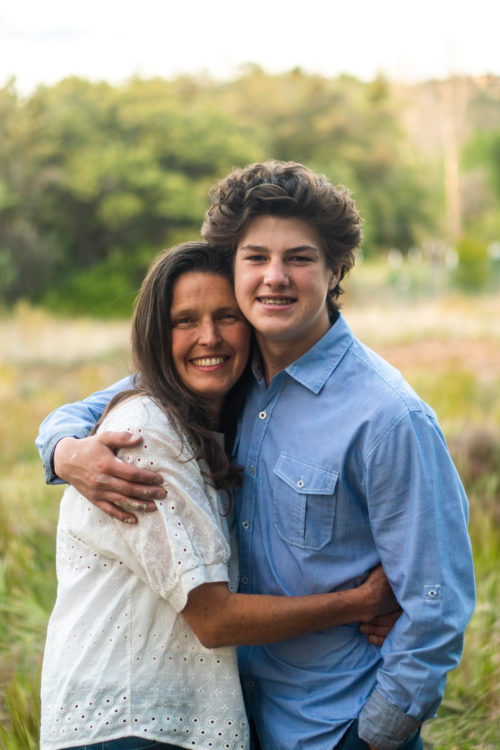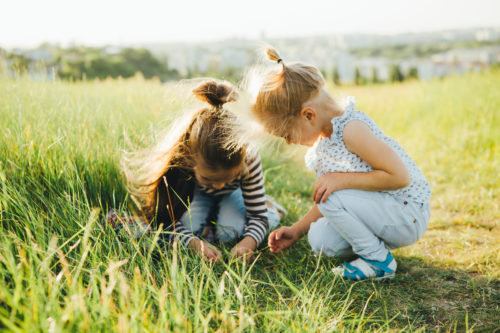Awe & Wonder:
Help Your Child Experience Their Soul in Action

As we discovered in part one of this series, “What does it mean to be human?” is a key question for you to explore with your child. BBC nature programmes, Youtubers and many teachers purport a completely secular understanding of this question. They tell your child “You are matter and chemicals and energy. You are here by blink luck and you are no more valuable than any other creature that roams our crowded planet. To be human is to be a body and a brain and nothing else.”
If it is true that we are only matter, chemicals and energy, that means that our DNA is driving us to be safe, to find sustenance and to survive. Our conscious experience, our longings and emotions, beauty and love, our decisions and, ultimately, our connection with God, are simply illusions in our biochemistry. We have no supernatural identity.
As Christian parents we want our children to know they are more than a body and a brain. We can help our children learn to identify the presence of their soul. We believe this will take them a long way in understanding their true spiritual nature as they wrestle with the question of what it means to be human.
One of the clues, or signposts, to the existence of our soul is our experience of taking in beauty and the floods of emotions that follow - emotions of awe and reverence.
At Start to Stir we believe the church needs to shift its ways of passing on truth from rote learning to learning-by-discovery. Help your children become aware of their soul initially by helping them experience it in action, and then by translating, or giving words, to that experience.

Awe and Reverence as a Signpost to the Soul
Opportunities for Awe bubble up from the earth through each blade of grass, each parade of working ants, each budding tree, each waddling hedgehog and beautiful vista. Awe can be found everywhere if we are looking- which is why it’s an especially good habit to develop in children. Our little children are low to the ground and often moving at the very pace that is necessary for awe and wonder. For the Christian, awe leads to reverence and reverence opens up an awareness of the soul.
“Reverence shrinks our understanding of ourself back down to our true self. I am only a human with limits. I am not capable of creating, holding together or even taking in all of the beauty I behold.” Barbara Brown Taylor, An Altar in the World.
Reverence is a gift that we are given that reminds us we are not God. Reverence is an awareness that someone greater than myself is holding together all that I see.
How do we practice awe and wonder?
Help your young children by getting low and experiencing the beauty of the earth with them. Build time into your weekly schedule to go outside or to the local park and just notice things. This might mean looking at the complexity of the centre of a tulip or sitting in the grass for three minutes and asking your child to show you everything they notice.
For older children, take short hikes that are rewarded with vast views, go to the seaside or the top of a hill to take in the sunrise or sunset. Intentionally get out of town and away from the lights and spend some moments lying on a blanket looking at the stars. No matter their age, your children won’t have trouble noticing and wondering. But what they most likely will lack are the words to translate the feelings of awe, reverence, satisfaction. When the serenity, peace and satisfaction of reverence takes over, draw attention to it.

Have These Soul Stirring Conversations
We can learn to ask:
“What are you feeling when you see this beauty?”
We can learn to say:
“You’ve noticed some beautiful things! I can’t take my eyes off the inside of that tulip! I feel peaceful and satisfied because it’s so beautiful. Do you feel that way? That feeling of contentment and peace is because you are a spiritual being. It’s coming from your soul.”
“When I see all this beauty I feel content. It helps me see that I am part of something bigger than myself. I am part of something that God is holding together. I don’t want to leave this moment.”
“You know, some people say those feelings are just the chemicals in our body and brain. But I think we actually sense those emotions of satisfaction and ‘rightness’ with the world are more than that. We want to hold onto these feelings and feel them more often! The beauty and awe we’ve just experienced is real- not just meaningless particles in our mind. You are a spiritual being and your spirit is responding to God.”

Why is experience so important if I want to teach my child about the soul?
We can anticipate your questions. Why not just teach them that in Genesis God breathed spiritual life (nephesh) into Adam? Or that Deuteronomy mentions loving God with our soul as well as our mind?
Over the past twenty years of working with youth in a post-Christian context, we have learned two important things. First, we’ve found explaining the soul is a pretty complex task and, honestly, it’s easier to experience it than to explain it.
Secondly, we’ve learned that the next generation decides what is true based first and foremost on their experience. Facts and rationale come later (if ever). So rather than attempting to use logic to convince individuals there we are spiritual beings, we’ve learned to rely on what God has already placed inside us to stimulate curiosity and then to point to longings that cannot be satisfied by the limits of self or the confines of this present life.
As you disciple your child you have the opportunity to subvert some of the power of our secular culture’s teaching about what it means to be human by being aware of the limits of naturalism and materialism to explain our longings. Learn to say, “I think that’s your soul in action,” so that the Biblical education you are giving your child matches up with their lived experience.
In part three of this series we will discover how to help your child experience their soul in action by translating their longing that the world is good and people are kind to each other.


Joy Stevens
Joy has been a youth worker for over 20 years. In addition to training Christian youth workers she regularly leads communication, digital media and fundraising projects for Start To Stir. Joy and Darin have two teenage daughters and a nutty ginger dog.
